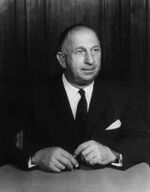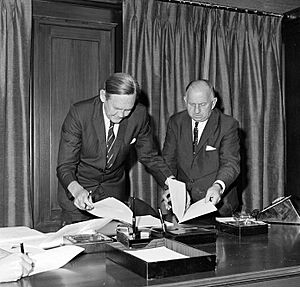Henry Bolte facts for kids
Quick facts for kids
Sir Henry Bolte
|
|
|---|---|
 |
|
| 38th Premier of Victoria Elections: 1955, 1958, 1961, 1964, 1967, 1970 |
|
| In office 7 June 1955 – 23 August 1972 |
|
| Monarch | Elizabeth II |
| Governor | Sir Dallas Brooks Sir Rohan Delacombe |
| Deputy | Sir Arthur Rylah Dick Hamer |
| Preceded by | John Cain (senior) |
| Succeeded by | Dick Hamer |
| Member of the Victorian Parliament for Hampden |
|
| In office 8 November 1947 – 24 August 1972 |
|
| Preceded by | Raymond Hyatt |
| Succeeded by | Tom Austin |
| Personal details | |
| Born | 20 May 1908 Ballarat East, Victoria, Australia |
| Died | 4 January 1990 (aged 81) Bamganie, Victoria, Australia |
| Political party | Liberal Party |
| Spouse |
Edith Lilian "Jill" Elder
(m. 1934; died 1986) |
| Occupation | Farmer |
Sir Henry Edward Bolte (1908–1990) was an Australian politician. He served as the 38th Premier of Victoria from 1955 to 1972. He was the leader of the Victorian division of the Liberal Party of Australia. Sir Henry was also a member of the Victorian Legislative Assembly for the area of Hampden from 1947 to 1972. He is the longest-serving Premier in Victorian state history, holding the office for over 17 years.
Contents
Early Life and Work
Henry Bolte was born on 20 May 1908 in Ballarat East, Victoria. His parents were Anna Jane and James Henry Bolte. His father was a miner, and both his parents had German family roots.
Soon after he was born, his family moved to Skipton. There, they ran a local pub called the Ripon Hotel. During World War I, his family faced some unfriendly feelings because of their German background.
Henry went to Skipton State School. Later, he attended Ballarat Grammar School as a boarding student. He left school in 1924 and returned to Skipton. He worked with land and ran a small shop. He also played cricket and football and was a swimming instructor. His shop closed in 1929. During the Great Depression, he worked as a shearer to earn money.
In 1934, Henry bought a sheep farm called Kialla near Meredith. In August 1940, he joined the Militia, which was a military force. He worked as an artillery instructor and pay clerk. He was not sent to fight overseas and left the military in January 1943.
Starting in Politics
Henry Bolte helped start the Liberal Party branch in Meredith in 1945. He first tried to become a member of parliament in the 1945 state election but did not win. However, in the 1947 election, he won the seat of Hampden. He defeated the person who held the seat before him, Raymond Hyatt from the Australian Labor Party.
Victorian politics was very changeable during this time. Governments often did not last long. The way elections were set up gave more power to rural areas. This meant the Country Party, which was a partner to the Liberals, had a lot of influence. As a Liberal from a rural area, Bolte did not get along well with the Country Party or the Labor Party.
In 1953, Henry Bolte became the leader of the Liberal Party in Victoria. The Australian Labor Party was in power under John Cain Sr.. However, in 1955, the Labor Party had a big disagreement within itself. This disagreement was about the influence of communism in trade unions. Because of this split, Bolte proposed a motion to remove Cain's government. Some Labor members who were against communism supported Bolte, and Cain's government fell.
After this, an election was held in 1955. Bolte's Liberal Party won by a large amount. This was partly because the anti-communist Labor members encouraged their voters to support the Liberals. This election started a long period of stable government for Victoria.
Bolte was known as a down-to-earth politician. He liked to be seen as a simple farmer, but he was very smart politically. With help from the Democratic Labor Party (which was formed by the anti-communist Labor members), Bolte became very strong in his position. He was re-elected six times. He was popular for speaking out against trade unions, intellectuals, and the media. His popularity was highest in the 1967 election.
Building Victoria's Future
Sir Henry Bolte used government money to build many important things for Victoria. He was very good at getting money from other countries to invest in the state.
Some of the big projects during his time as Premier included:
- Increasing coal production and power in the Latrobe Valley.
- Finding new oil and gas fields offshore in Gippsland.
- Building the West Gate Bridge over the Yarra River.
- Creating a new international airport for Melbourne at Tullamarine.
- Starting two new universities: Monash University and La Trobe University.
Bolte was easily re-elected in the 1958, 1961, and 1964 state elections.
Later Political Years

After 1968, when Bolte turned 60, some younger voters in cities started to like him less. He did not show much interest in new issues like the environment or civil liberties. There were also problems in the state's education system. There were not enough teachers and schools were too crowded because of the large number of children born after the war (the "baby boom"). The government hired many teachers from the United States to help. At the same time, the Labor Party started to become stronger with a new leader, Clyde Holding.
In the 1970 state elections, the Liberals seemed to be in danger of losing power. However, Bolte was helped by disagreements within the Labor Party. Even though the Liberals lost six seats, they stayed in power.
In 1972, Bolte was given a high honour, becoming a Knight Grand Cross of the Order of St Michael and St George (GCMG).
As 1972 began, the Liberals continued to lose support among younger voters in Melbourne. Bolte was smart enough to see that the party needed a new leader and a fresh image for the 1970s. In August 1972, he resigned from his position. He arranged for his Deputy Premier, Dick Hamer, to take over. Hamer was a more modern Liberal from Melbourne. This decision proved to be a good one, as Hamer went on to win three more elections for the Liberals.
Retirement and Passing
After leaving his role as Premier and retiring from Parliament, Sir Henry Bolte went back to his farm, 'Kialla', near Bamganie.
On 24 March 1984, Bolte was in a serious car accident. He was taken to the Ballarat Base Hospital. An investigation into the accident found that it would not be fair to charge him because there was an issue with how evidence was handled. Bolte later said, "Of course I know nothing, I was unconscious."
Sir Henry Bolte passed away at his home on 4 January 1990.
Honours and Tributes
Bolte was made a Knight Commander of the Order of St. Michael and St. George (KCMG) in 1966. In 1972, he was given an even higher honour, becoming a Knight Grand Cross (GCMG).
His wife, Lady Edith Lilian Bolte, also known as Jill Bolte, was honoured in 1973. She was made a Dame Commander of the Order of the British Empire for her great public service to Victoria.
A painting of Sir Henry Bolte by William Dargie can be seen in Queens Hall at Parliament House Victoria.
Bolte Bridge
The Bolte Bridge in Melbourne's Docklands area is named after him. It is a large bridge that crosses the lower Yarra River.
Images for kids



